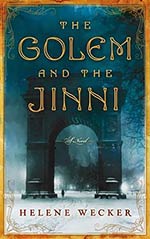
![]() everythinginstatic
everythinginstatic
12/9/2017
![]()
I'm not sure how to really feel about this one. After the high octane, end of the world shenanigans of City of Miracles , this book firmly pulls the breaks on you. And initially, I did find it a bit disorienting. Because where Bennett was all about the action, Wecker is far more interested in her characters. As it turns out, for very good reason, because they're incredibly interesting and engaging, their stories told in ways large and small. This novel is nearly 700 pages long as well, which I a) didn't notice as I was reading it on Kindle and b) didn't really feel like it would drag on for that long either, though I did want the conflict and revelations spread out just a little bit longer rather than rushed through in the last 15% of the book or so. It very much turned into a 'blink-and-you-miss-it' bit at the end.
It's New York, 1899 and a golem arrives to the new world, having been awoken on the ship by (spoiler). Well, it turns out that (spoiler) leaves one in somewhat of a predicament and soon, she finds herself in a new city, alone and unmoored. Taken in by a kindly Rabbi, she is given the name Chava and soon meets Ahmad, the Djinni in the title, like her a recent immigrant to New York. Soon, this turns into a story of immigration and belonging, of the pull of the 'new world' and how people lived together. Except Wecker doesn't just focus on the golem and the djinni: we have the Rabbi, the social worker, the ice cream maker, the girl in the bakery, the cafe owner, the young heiress, the tinsmith and the scholar of the dark Kabbalist arts and literally each and every one of them is a fleshed out, interesting character, with history and conflicts and motivation.
You'd be forgiven for thinking of this as just focusing on Chava and Ahmad, but instead, we get this entire panoply of characters and even the villain is, until the last few chapters, just one of the interesting background characters. In all their own ways, it's amazing to see how well Wecker is able to blend her mythology, the existence of golem and djinni, with the real world experiences of so many immigrants. As I've mentioned in previous reviews of books, I have a huge soft spot for immigrant storylines (being that I'm one myself) and what I really enjoyed was seeing how all these people, for better or for worse, adapt to their new lives. From those who don't speak the language and keep to their own areas to those who find it in their hearts to provide succour to everyone, Wecker is able to truly dig in to that side of human nature, that belief that ultimately, there is a bit of good in everyone.
But perhaps most of all, I enjoyed the relationship (not romantic, though I can't say I would have minded) between Chava and Ahmad, how they constantly challenge each other's assumptions about the world around them, how they're able to change that perception of humanity and its many compromises and quirks (with Chava desperately wanting the confirmation of a master's desire and Ahmad wishing to be back to his natural form and free to roam the desert), how they fall into this ease of being, because they must hide who they truly are from those around them or risk discovery and death. Where Chava fears her own nature (her superhuman strength, the fact that she has no heartbeat and must remember to feign breathing), Ahmad hates being imprisoned in what he sees to be a clearly inferior state. They both yearn for more and they find that way of expressing the need through each other. By the end of the novel, they have both very clearly changed, in gradual and subtle ways.
Now, for all that the plot moves along slowly (and seriously, look, I was perfectly content to read 400 pages of life at the bakery/tinsmith, exploration of New York and whatnot), the last part of the novel did feel rushed. The denouement, when it comes, is very rushed and I don't think it had quite the emotional impact that it could've had with even a little bit more time to unwind. I think Michael gets the short end of the stick and I remain ambivalent about whether this should have been a standalone or not. Now, you can definitely read it that way, though I would argue there are enough threads left dangling that you'd need some sort of follow up, but with The Iron Season coming out next year, it seems Wecker isn't done with this story. I don't think I am either.